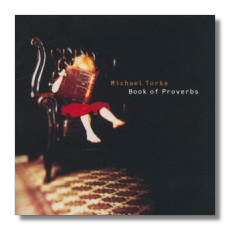
The Internet's Premier Classical Music Source
Related Links
- Torke Reviews
- Latest Reviews
- More Reviews
-
By Composer
-
Collections
DVD & Blu-ray
Books
Concert Reviews
Articles/Interviews
Software
Audio
Search Amazon
Recommended Links
Site News
 CD Review
CD Review
Michael Torke

Proverbs
- Book of Proverbs
- Four Proverbs 1
Valdine Anderson, soprano
Kurt Ollmann, baritone
1 Catherine Bott, vocals
Netherlands Radio Philharmonic Orchestra & Choir/Edo de Waart
1 Argo Band/Michael Torke
Argo 466721-2 DDD 52:11
It has been too long since the music of Michael Torke appeared on a new CD, but this disc was worth the wait. Curiously, Book of Proverbs was recorded in 1996, and Four Proverbs was recorded as early as 1993. Perhaps Argo's uncertain fate in the midst of changes to its erstwhile parent PolyGram Classics is responsible for this delay; be assured it has nothing to do with the quality of the music or the performances.
Book of Proverbs is in seven sections; an orchestral "Opening" introduces vocal settings of verses from the Old Testament. Some are short ("The door turns on its hinges, the sluggard, on his bed!"), others are longer. "Drink our Fill of Love" is the work's climax, and Torke sets it as a baritone solo, with support from the tenors and basses of the chorus. On the surface, this work is sweetness and light; "Opening" is so positive that it seems bound to be a hit, once it receives its due exposure. Nevertheless, there are fleeting hints of duplicity underneath. One of Torke's tricks is to rearrange the notes and words to create not just a new melody, but a new proverb. For example, the proverb cited above could be recomposed as "The sluggard turns his hinges, on the bed, on its door." The result, at least for me, is that many of the proverbs are called into question by Torke's deconstructive rewriting. The settings are syncopated, sometimes bouncy and sometimes slyly insinuating. I suppose the closest things to compare them to are the music of John Adams just when he started to get really famous (Nixon in China, for example) and some of Michael Nyman's work. Speaking of Adams, Edo de Waart is known for his skill in this repertoire, and he was the right choice here. The only complaint I have is the accented English of the Dutch choir; it makes the proverbs sound even weirder.
Four Proverbs is based on the same idea and is written in a similar style, but it is shorter, terser, and more intimate. Once again, Torke twists the mood ever so slightly by playing with word order. Also, he ends on a wistful note with the words "Even in laughter the heart may be sad, and the end of joy may be sorrow." Catherine Bott sings like a pop singer, or at least this is how she has been presented by the disc's producer. Her voice production is completely natural, and her delivery of the words is so personal that the listener might imagine that Bott is speaking just to him.
This is a short CD, but a small meal feeds the big of heart, and feasting leaves the cynic hungry.
Copyright © 2000, Raymond Tuttle



















